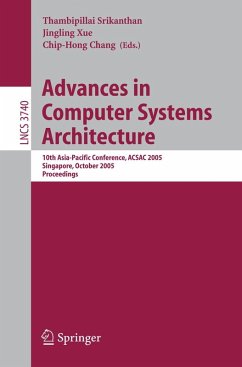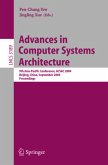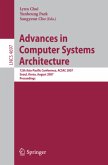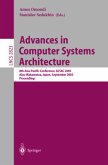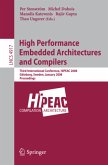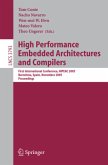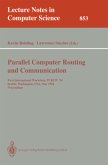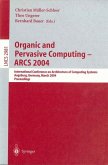Thambipillai Srikanthan / Jingling Xue / Chip-Hong Chang (eds.)10th Asia-Pacific Conference, ACSAC 2005, Singapore, October 24-26, 2005, Proceedings
Advances in Computer Systems Architecture
10th Asia-Pacific Conference, ACSAC 2005, Singapore, October 24-26, 2005, Proceedings
Herausgegeben:Srikanthan, Thambipillai; Xue, Jingling; Chang, Chip-Hong
Thambipillai Srikanthan / Jingling Xue / Chip-Hong Chang (eds.)10th Asia-Pacific Conference, ACSAC 2005, Singapore, October 24-26, 2005, Proceedings
Advances in Computer Systems Architecture
10th Asia-Pacific Conference, ACSAC 2005, Singapore, October 24-26, 2005, Proceedings
Herausgegeben:Srikanthan, Thambipillai; Xue, Jingling; Chang, Chip-Hong
- Broschiertes Buch
- Merkliste
- Auf die Merkliste
- Bewerten Bewerten
- Teilen
- Produkt teilen
- Produkterinnerung
- Produkterinnerung
On behalf of the ProgramCommittee, we are pleased to present the proceedings of the 2005 Asia-Paci?c Computer Systems Architecture Conference (ACSAC 2005) held in the beautiful and dynamic country of Singapore. This conference was the tenth in its series, one of the leading forums for sharing the emerging research ?ndings in this ?eld. In consultation with the ACSAC Steering Committee, we selected a - member Program Committee. This Program Committee represented a broad spectrum of research expertise to ensure a good balance of research areas, - stitutions and experience while maintaining the…mehr
Andere Kunden interessierten sich auch für
![Advances in Computer Systems Architecture Advances in Computer Systems Architecture]() Pen-Chung Yew / Jingling Xue (eds.)Advances in Computer Systems Architecture77,99 €
Pen-Chung Yew / Jingling Xue (eds.)Advances in Computer Systems Architecture77,99 €![Advances in Computer Systems Architecture Advances in Computer Systems Architecture]() Lynn Choi / Yunheung Paek / Sangyeun Cho (eds.)Advances in Computer Systems Architecture38,99 €
Lynn Choi / Yunheung Paek / Sangyeun Cho (eds.)Advances in Computer Systems Architecture38,99 €![Advances in Computer Systems Architecture Advances in Computer Systems Architecture]() Amos Omondi / Stanislav Sedukhin (eds.)Advances in Computer Systems Architecture39,99 €
Amos Omondi / Stanislav Sedukhin (eds.)Advances in Computer Systems Architecture39,99 €![High Performance Embedded Architectures and Compilers High Performance Embedded Architectures and Compilers]() Per Stenström / Michel Dubois / Manolis Katevenis / Rajiv Gupta / Theo Ungerer (eds.)High Performance Embedded Architectures and Compilers38,99 €
Per Stenström / Michel Dubois / Manolis Katevenis / Rajiv Gupta / Theo Ungerer (eds.)High Performance Embedded Architectures and Compilers38,99 €![High Performance Embedded Architectures and Compilers High Performance Embedded Architectures and Compilers]() Tom Conte / Nacho Navarro / Wen-mei W. Hwu / Mateo Valero / Theo Ungerer (eds.)High Performance Embedded Architectures and Compilers39,99 €
Tom Conte / Nacho Navarro / Wen-mei W. Hwu / Mateo Valero / Theo Ungerer (eds.)High Performance Embedded Architectures and Compilers39,99 €![Parallel Computer Routing and Communication Parallel Computer Routing and Communication]() BoldingParallel Computer Routing and Communication39,99 €
BoldingParallel Computer Routing and Communication39,99 €![Organic and Pervasive Computing -- ARCS 2004 Organic and Pervasive Computing -- ARCS 2004]() Christian Müller-Schloer / Theo Ungerer / Bernhard Bauer (Eds.)Organic and Pervasive Computing -- ARCS 200439,99 €
Christian Müller-Schloer / Theo Ungerer / Bernhard Bauer (Eds.)Organic and Pervasive Computing -- ARCS 200439,99 €-
-
-
On behalf of the ProgramCommittee, we are pleased to present the proceedings of the 2005 Asia-Paci?c Computer Systems Architecture Conference (ACSAC 2005) held in the beautiful and dynamic country of Singapore. This conference was the tenth in its series, one of the leading forums for sharing the emerging research ?ndings in this ?eld. In consultation with the ACSAC Steering Committee, we selected a - member Program Committee. This Program Committee represented a broad spectrum of research expertise to ensure a good balance of research areas, - stitutions and experience while maintaining the high quality of this conference series. This year's committee was of the same size as last year but had 19 new faces. We received a total of 173 submissions which is 14% more than last year. Each paper was assigned to at least three and in some cases four ProgramC- mittee members for review. Wherever necessary, the committee members called upon the expertise of their colleagues to ensure the highest possible quality in the reviewing process. As a result, we received 415 reviews from the Program Committee members and their 105 co-reviewers whose names are acknowledged inthe proceedings.Theconferencecommitteeadopteda systematicblind review process to provide a fair assessment of all submissions. In the end, we accepted 65 papers on a broad range of topics giving an acceptance rate of 37.5%. We are grateful to all the Program Committee members and the co-reviewers for their e?orts in completing the reviews within a tight schedule.
Produktdetails
- Produktdetails
- Theoretical Computer Science and General Issues 3740
- Verlag: Springer / Springer Berlin Heidelberg / Springer, Berlin
- Artikelnr. des Verlages: 11572961, 978-3-540-29643-0
- 2005
- Seitenzahl: 856
- Erscheinungstermin: 13. Oktober 2005
- Englisch
- Abmessung: 235mm x 155mm x 46mm
- Gewicht: 1268g
- ISBN-13: 9783540296430
- ISBN-10: 3540296433
- Artikelnr.: 21710141
- Herstellerkennzeichnung Die Herstellerinformationen sind derzeit nicht verfügbar.
- Theoretical Computer Science and General Issues 3740
- Verlag: Springer / Springer Berlin Heidelberg / Springer, Berlin
- Artikelnr. des Verlages: 11572961, 978-3-540-29643-0
- 2005
- Seitenzahl: 856
- Erscheinungstermin: 13. Oktober 2005
- Englisch
- Abmessung: 235mm x 155mm x 46mm
- Gewicht: 1268g
- ISBN-13: 9783540296430
- ISBN-10: 3540296433
- Artikelnr.: 21710141
- Herstellerkennzeichnung Die Herstellerinformationen sind derzeit nicht verfügbar.
Thambipillai Srikanthan, Nanyang Technological University, Singapore / Jingling Xue, University of New South Wales, Sydney, NSW, Australia / Chip-Hong Chang, Nanyang Technological University, Singapore
Keynote Address I.- Processor Architecture for Trustworthy Computers.- Session 1A: Energy Efficient and Power Aware Techniques.- Efficient Voltage Scheduling and Energy-Aware Co-synthesis for Real-Time Embedded Systems.- Energy-Effective Instruction Fetch Unit for Wide Issue Processors.- Rule-Based Power-Balanced VLIW Instruction Scheduling with Uncertainty.- An Innovative Instruction Cache for Embedded Processors.- Dynamic Voltage Scaling for Power Aware Fast Fourier Transform (FFT) Processor.- Session 1B: Methodologies and Architectures for Application-Specific Systems.- Design of an Efficient Multiplier-Less Architecture for Multi-dimensional Convolution.- A Pipelined Hardware Architecture for Motion Estimation of H.264/AVC.- Embedded Intelligent Imaging On-Board Small Satellites.- Architectural Enhancements for Color Image and Video Processing on Embedded Systems.- A Portable Doppler Device Based on a DSP with High- Performance Spectral Estimation and Output.- Session 2A: Processor Architectures and Microarchitectures.- A Power-Efficient Processor Core for Reactive Embedded Applications.- A Stream Architecture Supporting Multiple Stream Execution Models.- The Challenges of Massive On-Chip Concurrency.- FMRPU: Design of Fine-Grain Multi-context Reconfigurable Processing Unit.- Session 2B: High-Reliability and Fault-Tolerant Architectures.- Modularized Redundant Parallel Virtual File System.- Resource-Driven Optimizations for Transient-Fault Detecting SuperScalar Microarchitectures.- A Fault-Tolerant Routing Strategy for Fibonacci-Class Cubes.- Embedding of Cycles in the Faulty Hypercube.- Session 3A: Compiler and OS for Emerging Architectures.- Improving the Performance of GCC by Exploiting IA-64 Architectural Features.- An Integrated Partitioning and Scheduling Based Branch Decoupling.- A Register Allocation Framework for Banked Register Files with Access Constraints.- Designing a Concurrent Hardware Garbage Collector for Small Embedded Systems.- Irregular Redistribution Scheduling by Partitioning Messages.- Session 3B: Data Value Predictions.- Making Power-Efficient Data Value Predictions.- Speculative Issue Logic.- Using Decision Trees to Improve Program-Based and Profile-Based Static Branch Prediction.- Arithmetic Data Value Speculation.- Exploiting Thread-Level Speculative Parallelism with Software Value Prediction.- Keynote Address II.- Challenges and Opportunities on Multi-core Microprocessor.- Session 4A: Reconfigurable Computing Systems and Polymorphic Architectures.- Software-Oriented System-Level Simulation for Design Space Exploration of Reconfigurable Architectures.- A Switch Wrapper Design for SNA On-Chip-Network.- A Configuration System Architecture Supporting Bit-Stream Compression for FPGAs.- Biological Sequence Analysis with Hidden Markov Models on an FPGA.- FPGAs for Improved Energy Efficiency in Processor Based Systems.- Morphable Structures for Reconfigurable Instruction Set Processors.- Session 4B: Interconnect Networks and Network Interfaces.- Implementation of a Hybrid TCP/IP Offload Engine Prototype.- Matrix-Star Graphs: A New Interconnection Network Based on Matrix Operations.- The Channel Assignment Algorithm on RP(k) Networks.- Extending Address Space of IP Networks with Hierarchical Addressing.- The Star-Pyramid Graph: An Attractive Alternative to the Pyramid.- Building a Terabit Router with XD Networks.- Session 5A: Parallel Architectures and Computation Models.- A Real Coded Genetic Algorithm for Data Partitioning and Scheduling in Networks with Arbitrary Processor Release Time.- D3DPR: A Direct3D-Based Large-Scale Display Parallel Rendering System Architecture for Clusters.- Determining Optimal Grain Size for Efficient Vector Processing on SIMD Image Processing Architectures.- A Technique to Reduce Preemption Overhead in Real-Time Multiprocessor Task Scheduling.- Session 5B: Hardware-Software Partitioning, Verification, and Testing of Complex Architectures.- Minimizing Power in Hardware/Software Partitioning.- Exploring Design Space Using Transaction Level Models.- Increasing Embedding Probabilities of RPRPs in RIN Based BIST.- A Practical Test Scheduling Using Network-Based TAM in Network on Chip Architecture.- Session 6A: Architectures for Secured Computing.- DRIL- A Flexible Architecture for Blowfish Encryption Using Dynamic Reconfiguration, Replication, Inner-Loop Pipelining, Loop Folding Techniques.- Efficient Architectural Support for Secure Bus-Based Shared Memory Multiprocessor.- Covert Channel Analysis of the Password-Capability System.- Session 6B: Simulation and Performance Evaluation.- Comparing Low-Level Behavior of SPEC CPU and Java Workloads.- Application of Real-Time Object-Oriented Modeling Technique for Real-Time Computer Control.- VLSI Performance Evaluation and Analysis of Systolic and Semisystolic Finite Field Multipliers.- Session 7: Architectures for Emerging Technologies and Applications I.- Analysis of Real-Time Communication System with Queuing Priority.- FPGA Implementation and Analyses of Cluster Maintenance Algorithms in Mobile Ad-Hoc Networks.- A Study on the Performance Evaluation of Forward Link in CDMA Mobile Communication Systems.- Session 8: Memory Systems Hierarchy and Management.- Cache Leakage Management for Multi-programming Workloads.- A Memory Bandwidth Effective Cache Store Miss Policy.- Application-SpecificHardware-Driven Prefetching to Improve Data Cache Performance.- Targeted Data Prefetching.- Session 9: Architectures for Emerging Technologies and Applications II.- Area-Time Efficient Systolic Architecture for the DCT.- Efficient VLSI Architectures for Convolution and Lifting Based 2-D Discrete Wavelet Transform.- A Novel Reversible TSG Gate and Its Application for Designing Reversible Carry Look-Ahead and Other Adder Architectures.- Implementation and Analysis of TCP/IP Offload Engine and RDMA Transfer Mechanisms on an Embedded System.
Keynote Address I.- Processor Architecture for Trustworthy Computers.- Session 1A: Energy Efficient and Power Aware Techniques.- Efficient Voltage Scheduling and Energy-Aware Co-synthesis for Real-Time Embedded Systems.- Energy-Effective Instruction Fetch Unit for Wide Issue Processors.- Rule-Based Power-Balanced VLIW Instruction Scheduling with Uncertainty.- An Innovative Instruction Cache for Embedded Processors.- Dynamic Voltage Scaling for Power Aware Fast Fourier Transform (FFT) Processor.- Session 1B: Methodologies and Architectures for Application-Specific Systems.- Design of an Efficient Multiplier-Less Architecture for Multi-dimensional Convolution.- A Pipelined Hardware Architecture for Motion Estimation of H.264/AVC.- Embedded Intelligent Imaging On-Board Small Satellites.- Architectural Enhancements for Color Image and Video Processing on Embedded Systems.- A Portable Doppler Device Based on a DSP with High- Performance Spectral Estimation and Output.- Session 2A: Processor Architectures and Microarchitectures.- A Power-Efficient Processor Core for Reactive Embedded Applications.- A Stream Architecture Supporting Multiple Stream Execution Models.- The Challenges of Massive On-Chip Concurrency.- FMRPU: Design of Fine-Grain Multi-context Reconfigurable Processing Unit.- Session 2B: High-Reliability and Fault-Tolerant Architectures.- Modularized Redundant Parallel Virtual File System.- Resource-Driven Optimizations for Transient-Fault Detecting SuperScalar Microarchitectures.- A Fault-Tolerant Routing Strategy for Fibonacci-Class Cubes.- Embedding of Cycles in the Faulty Hypercube.- Session 3A: Compiler and OS for Emerging Architectures.- Improving the Performance of GCC by Exploiting IA-64 Architectural Features.- An Integrated Partitioning and Scheduling Based Branch Decoupling.- A Register Allocation Framework for Banked Register Files with Access Constraints.- Designing a Concurrent Hardware Garbage Collector for Small Embedded Systems.- Irregular Redistribution Scheduling by Partitioning Messages.- Session 3B: Data Value Predictions.- Making Power-Efficient Data Value Predictions.- Speculative Issue Logic.- Using Decision Trees to Improve Program-Based and Profile-Based Static Branch Prediction.- Arithmetic Data Value Speculation.- Exploiting Thread-Level Speculative Parallelism with Software Value Prediction.- Keynote Address II.- Challenges and Opportunities on Multi-core Microprocessor.- Session 4A: Reconfigurable Computing Systems and Polymorphic Architectures.- Software-Oriented System-Level Simulation for Design Space Exploration of Reconfigurable Architectures.- A Switch Wrapper Design for SNA On-Chip-Network.- A Configuration System Architecture Supporting Bit-Stream Compression for FPGAs.- Biological Sequence Analysis with Hidden Markov Models on an FPGA.- FPGAs for Improved Energy Efficiency in Processor Based Systems.- Morphable Structures for Reconfigurable Instruction Set Processors.- Session 4B: Interconnect Networks and Network Interfaces.- Implementation of a Hybrid TCP/IP Offload Engine Prototype.- Matrix-Star Graphs: A New Interconnection Network Based on Matrix Operations.- The Channel Assignment Algorithm on RP(k) Networks.- Extending Address Space of IP Networks with Hierarchical Addressing.- The Star-Pyramid Graph: An Attractive Alternative to the Pyramid.- Building a Terabit Router with XD Networks.- Session 5A: Parallel Architectures and Computation Models.- A Real Coded Genetic Algorithm for Data Partitioning and Scheduling in Networks with Arbitrary Processor Release Time.- D3DPR: A Direct3D-Based Large-Scale Display Parallel Rendering System Architecture for Clusters.- Determining Optimal Grain Size for Efficient Vector Processing on SIMD Image Processing Architectures.- A Technique to Reduce Preemption Overhead in Real-Time Multiprocessor Task Scheduling.- Session 5B: Hardware-Software Partitioning, Verification, and Testing of Complex Architectures.- Minimizing Power in Hardware/Software Partitioning.- Exploring Design Space Using Transaction Level Models.- Increasing Embedding Probabilities of RPRPs in RIN Based BIST.- A Practical Test Scheduling Using Network-Based TAM in Network on Chip Architecture.- Session 6A: Architectures for Secured Computing.- DRIL- A Flexible Architecture for Blowfish Encryption Using Dynamic Reconfiguration, Replication, Inner-Loop Pipelining, Loop Folding Techniques.- Efficient Architectural Support for Secure Bus-Based Shared Memory Multiprocessor.- Covert Channel Analysis of the Password-Capability System.- Session 6B: Simulation and Performance Evaluation.- Comparing Low-Level Behavior of SPEC CPU and Java Workloads.- Application of Real-Time Object-Oriented Modeling Technique for Real-Time Computer Control.- VLSI Performance Evaluation and Analysis of Systolic and Semisystolic Finite Field Multipliers.- Session 7: Architectures for Emerging Technologies and Applications I.- Analysis of Real-Time Communication System with Queuing Priority.- FPGA Implementation and Analyses of Cluster Maintenance Algorithms in Mobile Ad-Hoc Networks.- A Study on the Performance Evaluation of Forward Link in CDMA Mobile Communication Systems.- Session 8: Memory Systems Hierarchy and Management.- Cache Leakage Management for Multi-programming Workloads.- A Memory Bandwidth Effective Cache Store Miss Policy.- Application-SpecificHardware-Driven Prefetching to Improve Data Cache Performance.- Targeted Data Prefetching.- Session 9: Architectures for Emerging Technologies and Applications II.- Area-Time Efficient Systolic Architecture for the DCT.- Efficient VLSI Architectures for Convolution and Lifting Based 2-D Discrete Wavelet Transform.- A Novel Reversible TSG Gate and Its Application for Designing Reversible Carry Look-Ahead and Other Adder Architectures.- Implementation and Analysis of TCP/IP Offload Engine and RDMA Transfer Mechanisms on an Embedded System.

